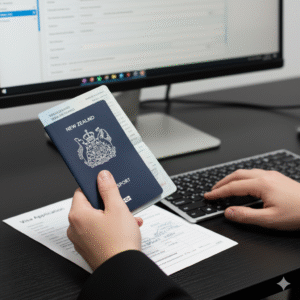Work Visa NZ: The Full Guide to Getting a Job in New Zealand
What Is a New Zealand Work Visa?
A New Zealand work visa allows you to legally work in New Zealand for a specific time, role, or employer. The main options include the Accredited Employer Work Visa, the Working Holiday Visa, and residence pathways such as the Skilled Migrant Category.
Each visa has its own eligibility rules, time limits, and possibilities for long-term settlement.
How New Zealand Work Visas Work
New Zealand work visas fall into two main categories:
- Temporary work visas – allow you to work for a fixed period
- Residence pathways – can lead to permanent residence if eligibility criteria are met
The right visa depends on:
- How long you plan to work in New Zealand
- Whether you intend to settle permanently
Main Types of New Zealand Work Visas
Accredited Employer Work Visa (AEWV)
This is the primary work visa for applicants who already have a job offer from an approved New Zealand employer.
Key points:
- A job offer is required
- The employer must be accredited
- Usually granted for up to three years
- May lead to residence in some cases
This visa is common in healthcare, IT, construction, engineering, and other high-demand sectors.
Skilled Migrant Category (Residence Visa)
This is a points-based residence visa for skilled workers who want to live and work in New Zealand permanently.
Key points:
- Points are awarded for age, qualifications, work experience, and employment
- Skilled employment is usually required
- Leads directly to permanent residence
- Designed for long-term settlement
Working Holiday Visa
This visa allows young people from eligible countries to work while travelling in New Zealand.
Key points:
- No job offer required
- Age limits usually range from 18 to 30 (some countries allow up to 35)
- Valid for 12 months
- Intended for short-term or casual work only
New Zealand Work Visa Comparison
| Visa Type | Job Offer Required | Typical Duration | Path to Residence |
|---|---|---|---|
| Accredited Employer Work Visa | Yes | Up to 3 years | Possible |
| Skilled Migrant Category | Usually | Permanent | Yes |
| Working Holiday Visa | No | 12 months | No |
| Partner Work Visa | No | Varies | Yes |
How to Apply for a New Zealand Work Visa
Most applications follow these steps:
- Choose the visa that matches your situation
- Secure a job offer if the visa requires one
- Gather required documents
- Apply online
- Complete medical and police checks
- Wait for a decision
Requirements vary depending on the visa type.

Documents You’ll Usually Need
Most applicants must provide:
- A valid passport
- A job offer or employment agreement (if required)
- Proof of qualifications or work experience
- Police certificates
- Medical examination results
- Evidence of English ability (in some cases)
Submitting complete and accurate documents helps avoid delays.
Processing Times
Processing times vary based on visa type and application quality:
- Working Holiday Visa: approximately 2–4 weeks
- Accredited Employer Work Visa: approximately 4–12 weeks
- Skilled Migrant residence visas: several months after invitation
Incomplete applications often take longer to process.
Costs to Expect
Costs depend on the visa type and individual circumstances. Common expenses include:
- Visa application fees
- Medical examinations
- Police certificates
- Document translations
Fees change over time, so always confirm current costs before applying.
Common Reasons Applications Are Refused
Applications are commonly declined due to:
- Choosing the wrong visa
- Missing or incorrect documentation
- Not meeting skill or experience requirements
- Health or character concerns
- Relying on outdated immigration rules
Avoiding these issues improves approval chances.
Living and Working in New Zealand
New Zealand is known for:
- A standard 40-hour work week
- Strong work–life balance
- A relaxed and respectful workplace culture
Skilled workers are in demand in healthcare, IT, construction, engineering, education, and agriculture.
Where to Find Official Information
All official rules, updates, and visa requirements are published by Immigration New Zealand.
Always check official sources before applying, as immigration policies can change.
Final Summary
A New Zealand work visa provides a legal pathway to work in the country, either temporarily or as a step toward permanent residence. Success depends on selecting the right visa, preparing accurate documentation, and following the application process carefully.
Whether you plan a short stay or a long-term move, New Zealand offers clear and structured work visa options for people with a wide range of skills and backgrounds.
FAQs
Can I work in New Zealand without a job offer?
Yes. You can work without a job offer on a Working Holiday Visa or certain Partner Work Visas. Most skilled work visas, including the Accredited Employer Work Visa, require a confirmed job offer.
Which New Zealand work visa is easiest to get?
For eligible young travelers, the Working Holiday Visa is usually the easiest because no job offer is required. For skilled workers with employment secured, the Accredited Employer Work Visa is typically the most practical option.
How long can I stay in New Zealand on a work visa?
Temporary work visas usually allow stays from 12 months to 3 years. Residence visas, such as the Skilled Migrant Category, allow you to live and work in New Zealand permanently if you meet eligibility criteria.
Can a New Zealand work visa lead to permanent residence?
Yes. Some work visas, including the Accredited Employer Work Visa, can lead to residence. The Skilled Migrant Category is a direct pathway to permanent residence.
How long does it take to get a New Zealand work visa?
Processing times vary by visa. Working Holiday Visas often take 2–4 weeks, Accredited Employer Work Visas about 4–12 weeks, and residence visas several months after invitation.
What documents are required for a New Zealand work visa?
Most applicants need a valid passport, a job offer if required, proof of qualifications or work experience, police certificates, medical exam results, and sometimes proof of English ability.
Why are New Zealand work visa applications refused?
Common reasons include missing documents, choosing the wrong visa, not meeting skill requirements, health or character concerns, or relying on outdated immigration rules.
Where can I find official New Zealand work visa information?
Official rules, fees, and updates are published by Immigration New Zealand. Always check official sources before applying.







